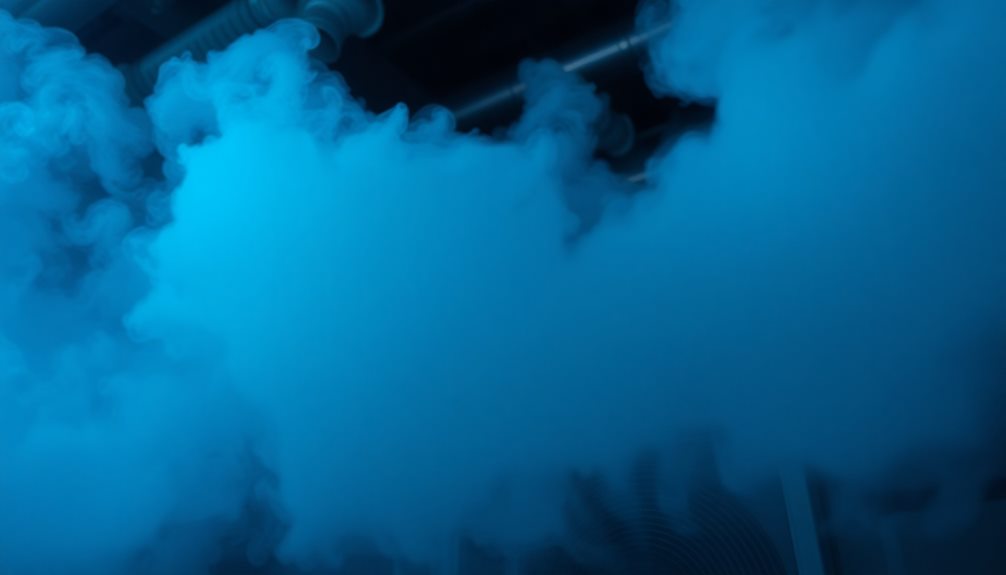If you smell a sweet, chemical odor, it might be leaking Freon. This scent is often compared to chloroform or acetone, and recognizing it is super important. Leaking Freon can happen in hot weather, especially in older AC systems. That smell isn't just unpleasant; it can also signal potential health risks, like dizziness or headaches. So, if you catch a whiff, it's best to act fast. Open the windows for fresh air and get a pro to check it out before any damage or danger occurs. Stick around to learn more about how to handle this situation safely!
Key Takeaways
- Leaking Freon has a sweet, chemical odor similar to chloroform and acetone.
- The smell may be sharp or pungent, causing discomfort when inhaled.
- Freon itself is colorless and odorless; unusual smells indicate a leak.
- Stronger odors signal more serious issues, often linked to aging HVAC systems.
- Immediate action is essential, as inhaling Freon can lead to health risks.
Introduction
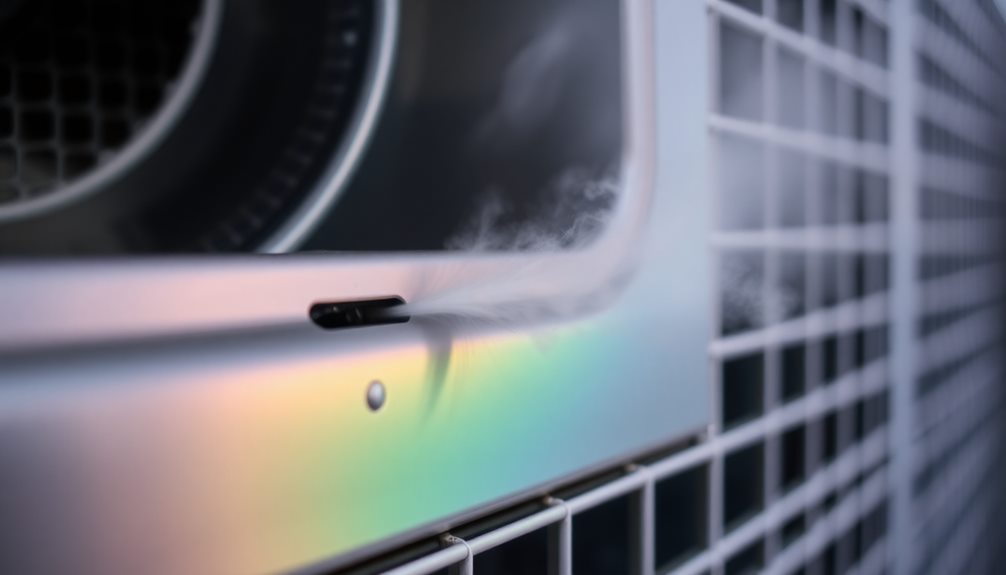
When you notice a leaking Freon smell, it can evoke concern and urgency. You might wonder what's causing it and how it affects your home.
Freon, a refrigerant used in air conditioning and refrigeration systems, can be harmful if it leaks. Your safety and the environment are important, so understanding this smell is crucial.
It's essential to act quickly. If you detect this odor, you should identify the source. It could be your air conditioning unit, refrigerator, or another cooling device.
Ignoring it could lead to further issues, including damage to your appliances or potential health risks.
Getting a professional to inspect your systems is a good idea. They can determine if there's a leak and fix it before it becomes a more significant problem.
Meanwhile, try to ventilate the area by opening windows or turning off the appliance, if it's safe to do so.
Description of the Smell
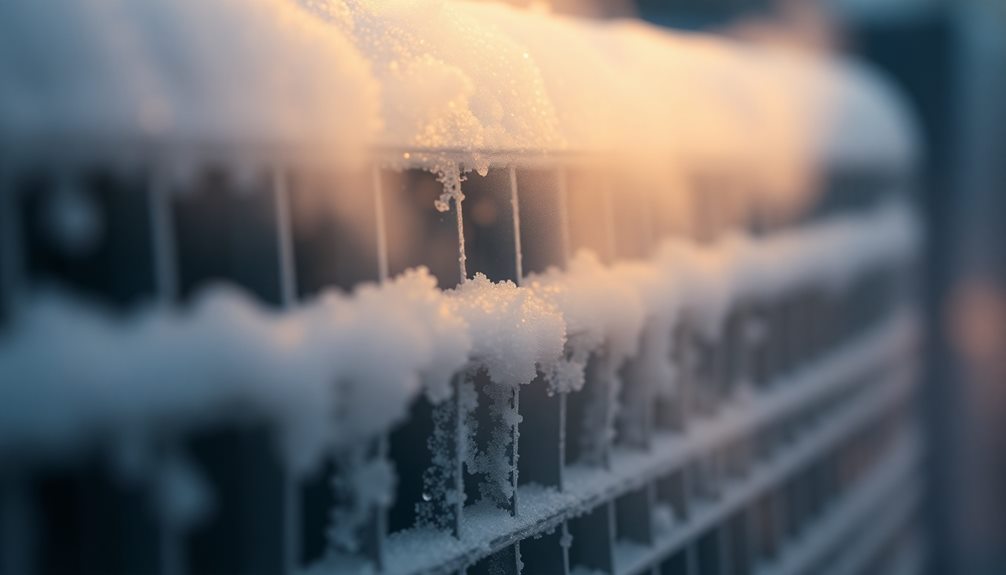
Recognizing the smell of leaking Freon is key to addressing potential issues quickly. When you encounter a Freon leak, you might notice a slightly sweet, chemical odor that can remind you of a mix of chloroform and acetone.
This distinct scent isn't something you want lingering around! If you've ever caught a whiff of a new refrigerator or air conditioning unit, you might be familiar with that faint, almost sugary smell.
However, if the smell becomes stronger or more pronounced, that's a sign you should pay attention. You might find the scent can even be a bit sharp or pungent, making it feel a little uncomfortable to breathe in.
It's essential to trust your nose; if something seems off, it probably is!
Source and Composition
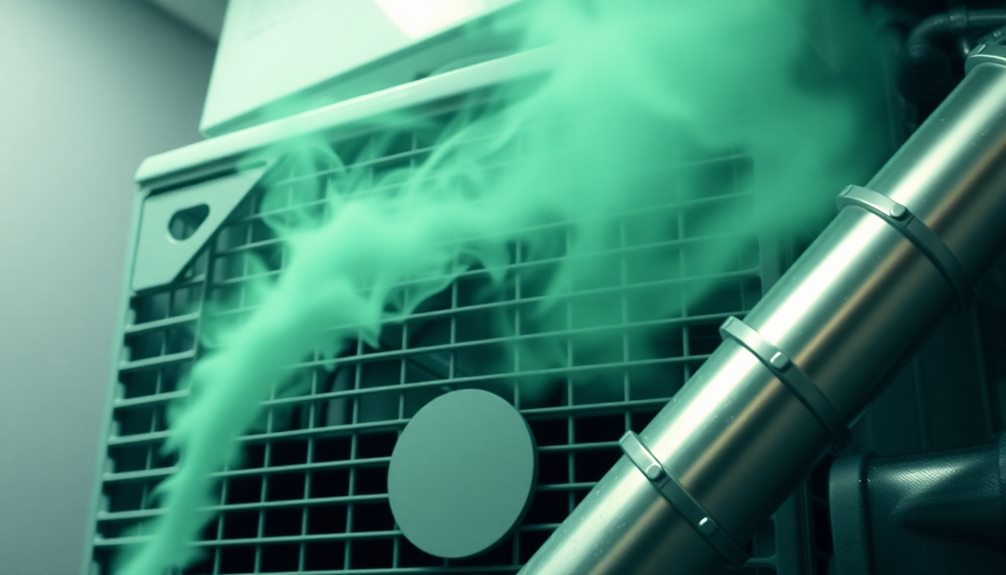
Freon, a common refrigerant used in air conditioning and refrigeration systems, comes from a class of compounds known as chlorofluorocarbons (CFCs) and hydrofluorocarbons (HFCs).
These compounds were invented in the 1920s and quickly became popular due to their efficiency and low toxicity.
You might find it interesting that while Freon itself is colorless and odorless, leaks can lead to unusual smells that signal something's wrong with your system.
When Freon leaks, it often mixes with other materials in your appliance, which can create distinctive scents.
This is where the confusion begins! If you detect a strange smell, it could be a combination of Freon and other substances like oil or dust.
It's essential to recognize that the smell isn't Freon itself but rather the result of this mix.
Typical Scenarios or Environments
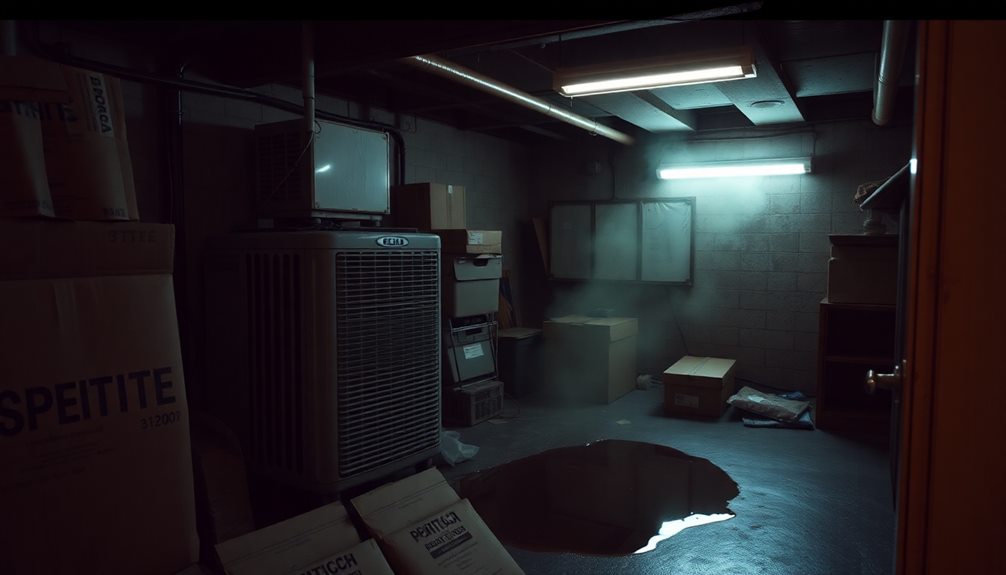
Many homeowners encounter leaking Freon in various scenarios, especially during the hot summer months when air conditioning systems work overtime.
Picture this: you've just turned on your AC to escape the sweltering heat, but instead of a cool breeze, you catch a whiff of something strange. That's when you might start to wonder if there's a Freon leak.
You might find this issue in older homes where HVAC systems have seen better days. Sometimes, a cracked coil or loose connection lets Freon escape.
If you live in a humid area, moisture can also contribute to leaks, making it essential to stay vigilant. Even new systems can have problems, especially during installation if something isn't sealed correctly.
You could also notice leaks in commercial buildings, like offices or restaurants, where multiple cooling units work together.
Regular maintenance checks are crucial in these environments to prevent surprises.
Emotional or Cultural Associations
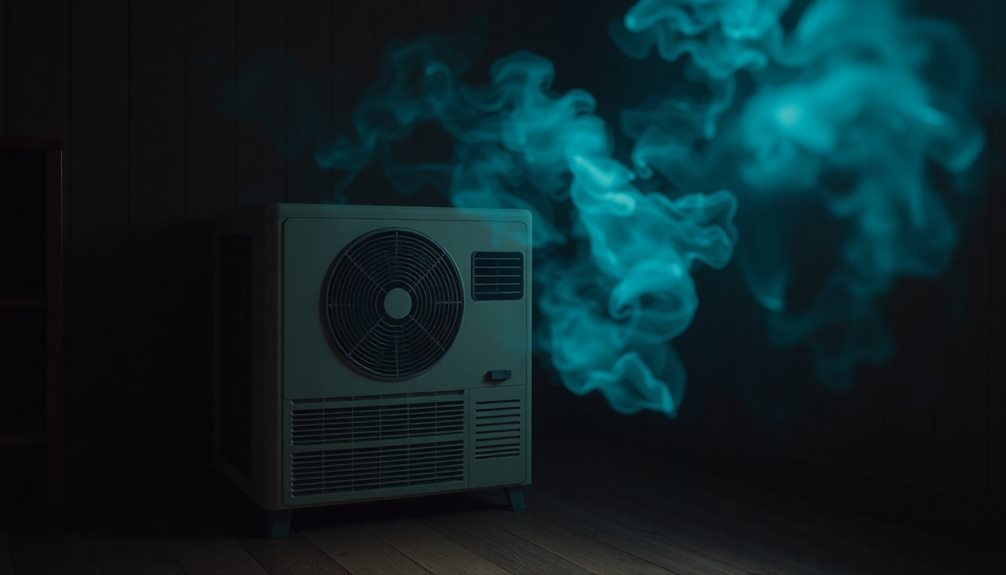
The smell of leaking Freon can evoke a range of emotions, from concern about potential damage to your air conditioning system to anxiety over costly repairs. You might find yourself feeling uneasy, imagining the worst-case scenario. This smell often brings thoughts of hot summer days when you rely on your AC to keep cool.
For many, the scent can also stir memories of home. Perhaps you recall the comforting chill of a well-functioning air conditioner during family gatherings or lazy weekends. But when that familiar scent turns sour, it can lead to feelings of dread. You might think about the impact on your comfort and the unexpected expense that could follow.
Culturally, the smell of Freon can symbolize a breakdown in the modern conveniences we often take for granted. It's a reminder of our reliance on technology.
While the smell mightn't be pleasant, it serves as a wake-up call. It encourages you to take action before small issues become big problems. So, when you catch that whiff, remember to stay calm and address the situation promptly. It's a small step towards maintaining your peace of mind!
Health or Safety Considerations

Detecting a leaking Freon smell can raise immediate health and safety concerns. When Freon escapes into the air, it can cause headaches, dizziness, or even trouble breathing. If you notice a sweet, chloroform-like odor, it's essential to take it seriously. You don't want to ignore it!
Freon is a refrigerant, and when it leaks, it can displace oxygen in the air. This can lead to a dangerous situation, especially in closed spaces. If you're feeling lightheaded or nauseous, it's time to step outside for fresh air. Opening windows can help too!
It's also crucial to understand that Freon is harmful to the environment. It contributes to ozone depletion, so reporting leaks helps protect our planet. If you suspect a Freon leak, don't try to fix it yourself. Call a professional technician who can safely handle the situation.
Keeping your home safe and healthy is a top priority. Be vigilant! Regular maintenance of your air conditioning system can prevent leaks from occurring in the first place.
Final Thoughts

Addressing a leaking Freon smell is crucial for your health and safety. If you ever detect that strange, sweet odor, it's important to act quickly. Freon, commonly used in air conditioning and refrigeration systems, can be harmful if inhaled in large amounts. You don't want to take any chances, right?
Start by turning off your air conditioning unit to prevent further leaks. It's best to open windows to let in fresh air and dilute any lingering gas. Then, contact a qualified technician who can find the source of the leak and repair it safely.
Remember, you're not just protecting yourself; you're also safeguarding others who may be affected by the fumes.
Don't ignore your senses! If you smell Freon, you're doing the right thing by paying attention. Freon leaks can lead to serious health issues, so addressing them promptly is key.
Frequently Asked Questions
Can Leaking Freon Cause Damage to My Appliances?
Yes, leaking Freon can cause damage to your appliances. It affects cooling efficiency and might lead to more significant issues, requiring costly repairs. Regular maintenance helps prevent leaks and prolongs your appliance's lifespan.
How Can I Detect Freon Leaks in My Home?
To detect Freon leaks in your home, check your appliances for ice buildup or strange noises. You can also use a leak detector or soap solution to identify escaping gas. Regular maintenance helps prevent leaks too.
Is It Safe to Stay in a House With Freon Leaks?
Staying in a house with freon leaks isn't safe. Exposure can lead to health issues like respiratory problems. If you suspect a leak, it's best to leave the area and contact a professional immediately.
What Should I Do if I Suspect a Freon Leak?
If you suspect a Freon leak, turn off your HVAC system immediately. Ventilate the area by opening windows, and contact a certified technician to inspect and repair the leak safely. Don't delay; prioritize your safety.
How Does Freon Impact the Environment When Leaked?
When freon leaks, it contributes to ozone depletion and global warming. You're harming the environment, so it's crucial to handle any leaks immediately. Proper disposal and repair can minimize your impact on our planet.
